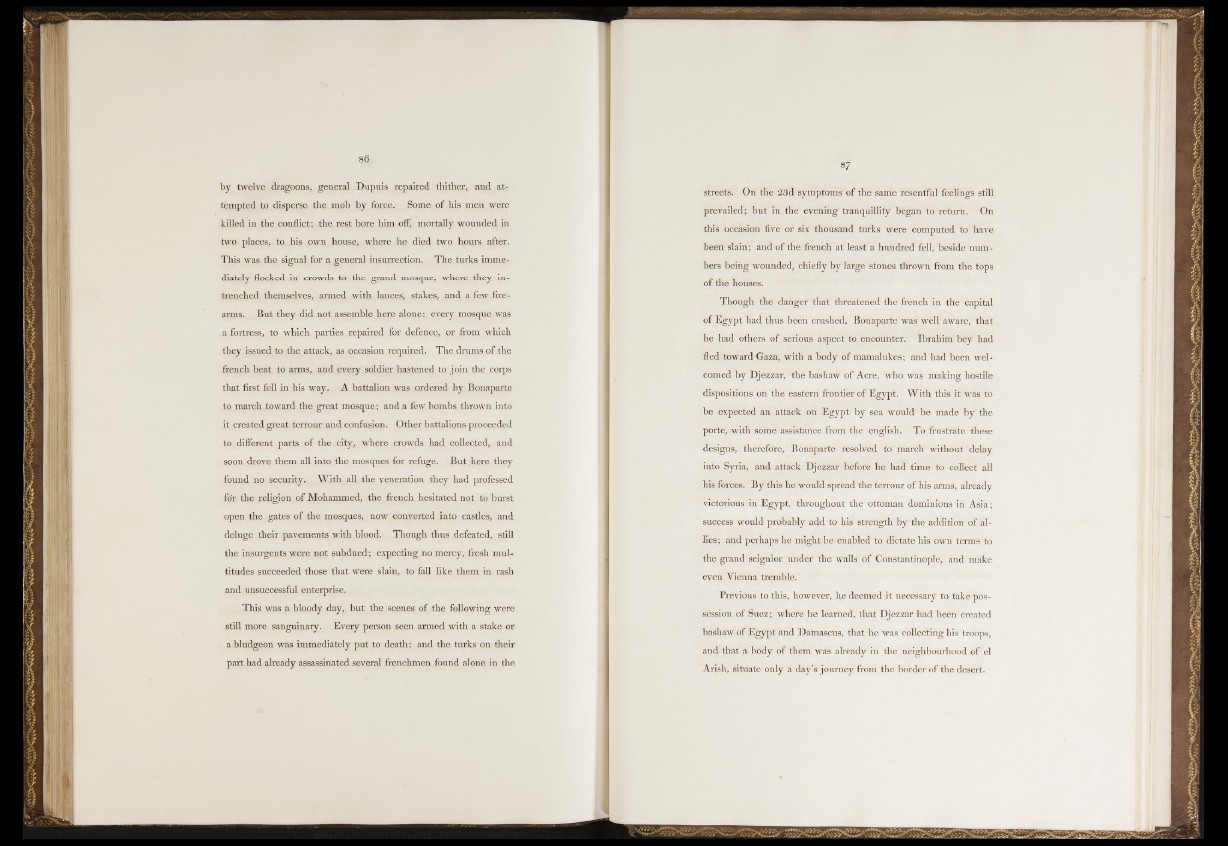
by twelve dragoons, general Dupuis repaired thither, and attempted
to disperse the mob by force. Some of his men were
killed in the conflict; the rest bore him off, mortally wounded in
two places, to his own house, where he died two hours after.
This was the signal for a general insurrection. The turks immediately
flocked in crowds to the grand mosque, where they intrenched
themselves, armed with lances, stakes, and a few firearms.
But they did not assemble here alone: every mosque was
a fortress, to which parties repaired for defence, or from which
they issued to the attack, as occasion required. The drums of the
french beat to arms, and every soldier hastened to join the corps
that first fell in his way. A battalion was ordered by Bonaparte
to march, toward the great mosque; and a few bombs thrown into
it created great terrour and confusion. Other battalions proceeded
to different parts of the city, where crowds had collected, and
soon drove them all into the mosques for refuge. But here they
found no security. W ith all the veneration they had professed
fo'r the religion of Mohammed, the french hesitated not to burst
open the gates of the mosques, now converted into castles, and
deluge their pavements with blood. Though thus defeated, still
the insurgents were not subdued; expecting no mercy, fresh multitudes
succeeded those that were slain, to fall like them in rash
and unsuccessful enterprise.
This was a bloody day, but the scenes of the following were
still more sanguinary. Every person seen armed with a stake or
a bludgeon was immediately put to death; and the turks on their
part had already assassinated several frenchmen found alone in the
streets. On the 23d symptoms of the Same resentful feelings still
prevailed; but in the evening tranquillity began to return. On
this occasion five or six thousand turks were computed to have
been slain; and of the french at least a hundred fell, beside numbers
being wounded, chiefly by large stones thrown from the tops
of the houses.
Though the danger that threatened the french in the capital
of Egypt had thus been crushed, Bonaparte was well aware, that
he had others of serious aspect to encounter. Ibrahim bey had
fled toward Gaza, with a body of mamalukes; and had been welcomed
by Djezzar, the bashaw of Acre, who was making hostile
dispositions on the eastern frontier of Egypt. W ith this it was to
be expected an attack on Egypt by sea would be made by the
porte, with some assistance from the english, To frustrate these
designs, therefore, Bonaparte resolved to march without delay
into Syria, and attack Djezzar before he had time to collect all
his forces. By this he would spread the terrour of his arms, already
victorious in Egypt, throughout the ottoman dominions in Asia;
success would probably add to his strength by the addition of allies;
and perhaps he might be enabled to dictate his own terms to
the grand seignior under the walls of Constantinople, and make
even Vienna tremble.
Previous to this, however, he deemed it necessary to take possession
of Suez; where he learned, that Djezzar had been created
bashaw of Egypt and Damascus, that he was collecting his troops,
and that a body of them was already in the neighbourhood of el
Arish, situate only a day’s journey from the border of the desert.